Why is Bahrain’s Israel-friendly foreign minister being given the boot?
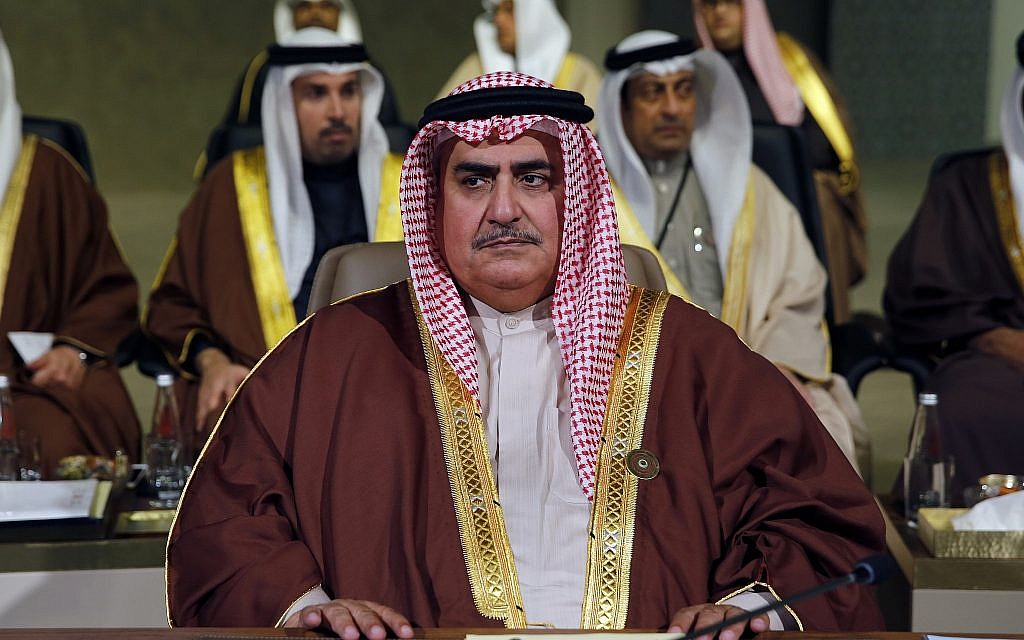
As Israeli leaders continue to enthuse over the Jewish state’s growing rapprochement with the Arab world, one of the most visible proponents of this process — the only senior Gulf official who has repeatedly defended not only Israel’s right to exist but its right to defend itself militarily — is being removed from his post.
Bahraini Foreign Minister Sheikh Khalid bin Ahmed Al-Khalifa, who has held his position since 2005, is being replaced by Abdullatif bin Rashid Al Zayani, the tiny Gulf nation’s monarch decided earlier this month. The reasons for the veteran top diplomat’s sudden ouster are unclear.
The reshuffle will take effect in April, after Zayani concludes his current position as secretary-general of the Gulf Cooperation Council. Khalifa, who repeatedly made headlines for his pro-Israel statements and gestures, will leave the foreign ministry and assume a new and hitherto undefined role as “adviser for diplomatic affairs” to King Hamad.
In announcing the shake-up, the government in Manama did not indicate whether Khalifa was being promoted or demoted, but analysts agree that being removed from the foreign ministry cannot be seen as anything but a downgrade.
What the analysts are not sure of is the background for the king’s move.
“We need to be very careful and not jump to conclusions. But this foreign minister has in recent years been very pro-Israel but has returned in the last few weeks to a more conservative, old-fashioned position vis-a-vis Israel,” said Yoel Guzansky, a senior researcher at Tel Aviv University’s Institute for National Security Studies who focuses on the Gulf states.
Specifically, Guzansky was referring to Khalifa’s November 23 speech at a regional conference in Manama, during which the foreign minister had no good words for Israel, lamenting that Jerusalem “continues to ignore international law… as it expands its settlements in the West Bank and continues its occupation of the Golan Heights.”
Israel can only “truly benefit from better relations with the region” if it shows its desire to make peace and commits to the creation of a Palestinian state, Khalifa added.
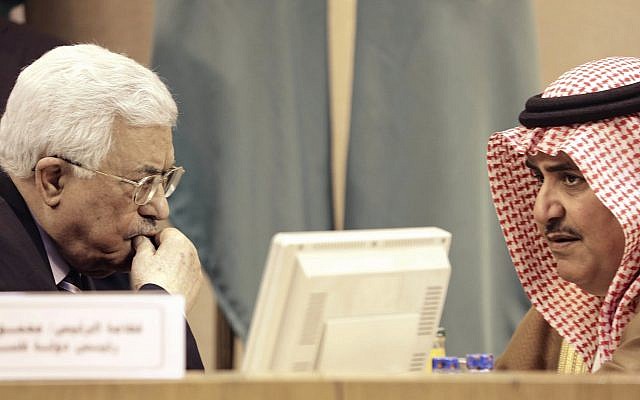
“I saw this speech as a bad omen,” Guzansky said. “He took two steps back” from previous comments about his desire to improve relations with Israel. “Maybe he had gone too far.”
Guzansky posited that perhaps the powers that be in Bahrain came to believe the US administration — which issued the first part of its two-pronged Israeli-Palestinian peace plan in Manama — would not be releasing the second part any time soon. “Or perhaps they worried about Iran and other radical elements. Maybe their Saudi patrons said ‘You went too far’?”
Al Araby, a website started by Azmi Bishara, a fugitive former Israeli Knesset member who is close to Qatar, dedicated a lengthy article to various speculations about the Bahraini reshuffle.
Possible reasons for Khalifa’s ouster included his “hostile attitudes” toward Iran and Qatar, his reputation as “one of the godfathers of normalization with Israel,” his public statements in support of Israel’s right to defend itself and intra-palace intrigues in Manama.
Simon Henderson, a leading expert on Bahrain at the Washington Institute for Near East Policy, said that Khalifa’s departure was not unexpected because the foreign ministry in Manama had become an “unhappy ship” under his leadership.
Khalifa was not providing the “bureaucratic leadership Bahraini diplomats wanted,” Henderson told The Times of Israel.
Khalifa was a strong advocate of developing links with Israel. He was also forthright in his condemnation of Qatar. Zayani may tone down this rhetoric
A member of the royal family himself, Khalifa was an ally of Crown Prince Salman, the leader of the moderate camp in the Bahraini monarchy, Henderson added.
Khalifa’s departure will probably lead to “cosmetic changes in policy,” he estimated. “He was a strong advocate of developing links with Israel. He was also forthright in his condemnation of neighboring Qatar. Zayani may tone down this rhetoric, perhaps on both issues.”
The outgoing foreign minister’s upcoming role in the shaping of foreign policy “may well be minimal,” Henderson said, despite his fancy title as “diplomatic adviser” to King Hamad.
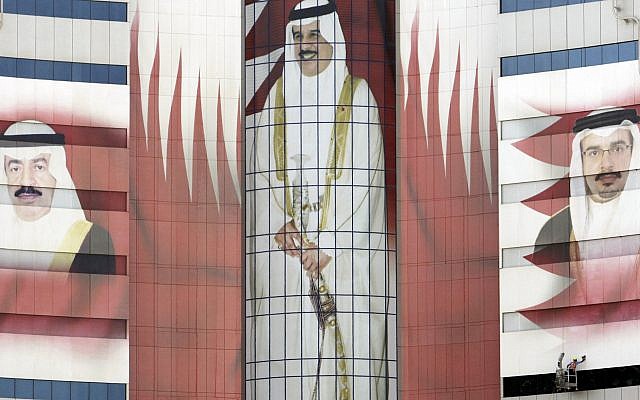
Whatever the true reason behind the reshuffle, all parties involved have publicly put a good face on it.
In his January 2 announcement, Crown Prince Salman praised Khalifa’s successes at the helm of the foreign ministry, “especially his contribution to the advancement and promotion of the Kingdom’s international agenda.” He went on to wish him the “very best in his new position as His Majesty the King’s Adviser for Diplomatic Affairs.”
On the same day, Khalifa, a self-professed “world traveler and bon vivant,” took to Twitter to signal subservience. “I served his majesty and my country with everything I could. I will continue to serve them as long as I live,” he wrote, adding that he was now “handing over the banner to a dear, capable brother who I learned a lot from.”
خدمت سيدي صاحب الجلالة و وطني بكل ما أوتيت من جهد و استطاعة ، و سأظل اخدمهم ما حييت . كما تشرفت ايما تشريف بالعمل تحت إمرة صاحب السمو الملكي رئيس الوزراء أعاده الله لنا سالمًا غانمًا و صاحب السمو الملكي ولي العهد الأمين . و الان أسلم الراية لأخ قدير عزيز تعلمت منه الكثير .
— خالد بن أحمد (@khalidalkhalifa) Enero 2, 2020
A few days later, King Hamad received his outgoing top diplomat in his palace, wishing him success and praising him for “the valuable efforts” to strengthen Bahrain’s foreign relations.
Khalifa, for his part, thanked the king for the support he has received over the years, adding that his majesty’s “pertinent instructions” enabled him to lead Bahraini diplomacy to unknown heights and to defend “the kingdom’s interests abroad and [strengthen] its pioneering position regionally and internationally.”
A photo of the meeting, posted on the foreign ministry’s website, shows the two men smiling at each other — though sitting far apart.
On Monday Khalifa welcomed Zayani at the Foreign Ministry. Oddly, a readout of the meeting cited the two men pouring praise over each other but entirely ignored the elephant in the room — that the ousted minister was hosting his designated successor.
FM @khalidalkhalifa receives #GCC Secretary Generalhttps://t.co/7VCRzZB4cS pic.twitter.com/r93vDFvoVB
— وزارة الخارجية 🇧🇭 (@bahdiplomatic) Enero 14, 2020
Very little is known about Zayani’s intended influence on Bahraini foreign policy, the basic tenets of which are set by the king.
Noting the fact that Khalifa wouldn’t have dared to position himself as Israel-friendly without a green light from the royal palace, some analysts assume that Manama will continue its general course of rapprochement with Jerusalem — but perhaps with a lower public profile.
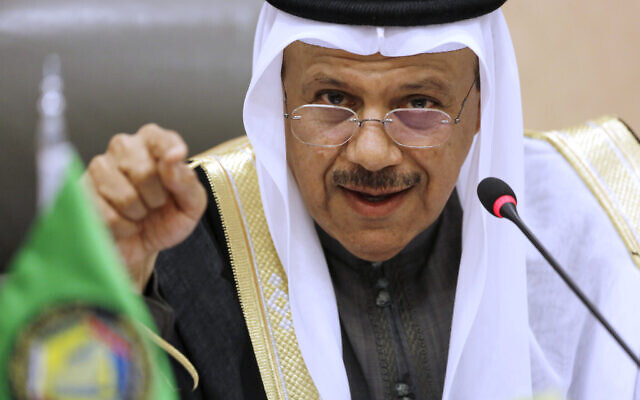
In Israel, Khalifa’s imminent departure was hardly noticed, and politicians in Jerusalem are indicating that they expect the warming of ties with the Gulf to continue unabated.
“The opportunity to develop new relations with Arab countries, this possibility is greater than ever,” Prime Minister Benjamin Netanyahu said at Sunday’s weekly cabinet meeting. “We are working on it. I am working on it, every day, including recently. I believe that this can bear fruit soon.”
The first Gulf foreign minister to speak to Israeli media
Khalifa was to large extent the face of rapprochement between Israel and Gulf states, being the first foreign minister from the region to grant on-record interviews to Israeli reporters and even have his photo taken with his Israeli counterpart.
In May 2018, following an Israeli air strike on Iranian targets in Syria, Khalifa tweeted, in Arabic: “As long as Iran continues the current status quo of its forces and rockets operating in the region, any country — including Israel — has the right to defend itself by eliminating the source of danger.”
In February of 2019, he argued the Israeli-Palestinian peace process would be in a much better place if not for Iran’s malign behavior.
“We grew up talking about the Israel-Palestine issue as the most important issue” that had to be “solved, one way or another,” he said at a closed-door event on the sidelines of a security conference in Warsaw. “But then, at a later stage, we saw a bigger challenge, we saw a more toxic one — in fact the more toxic one in our history — that came from the Islamic Republic.”
Four months later, Khalifa granted three interviews to Israeli media, including The Times of Israel, during which he explicitly recognized Israel’s right to exist. “So we do believe that Israel is a country to stay, and we want a better relation with it, and we want peace with it,” he told this reporter at the time.
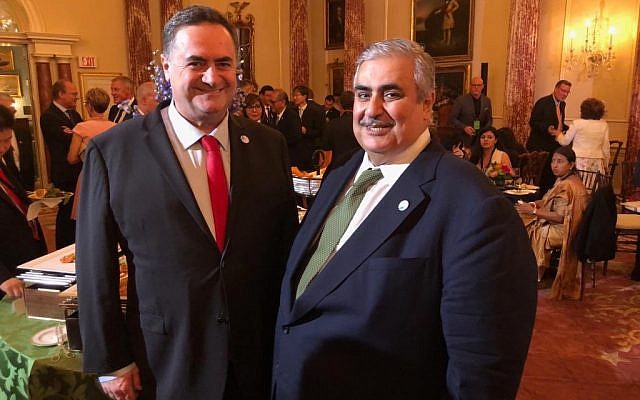
In July, Khalifa posed for an unprecedented photo with Israel’s Foreign Minister Israel Katz at the sidelines of an event in Washington, DC, in what the latter hailed as “another example of our growing diplomatic connections.”
Katz later issued a statement saying the meeting was organized by US State Department officials and that he and Khalifa “discussed Iran, regional threats and bilateral relations, and agreed to remain in contact.
Khalifa himself never publicly spoke about the meeting.
As reported by The Times of Israel
